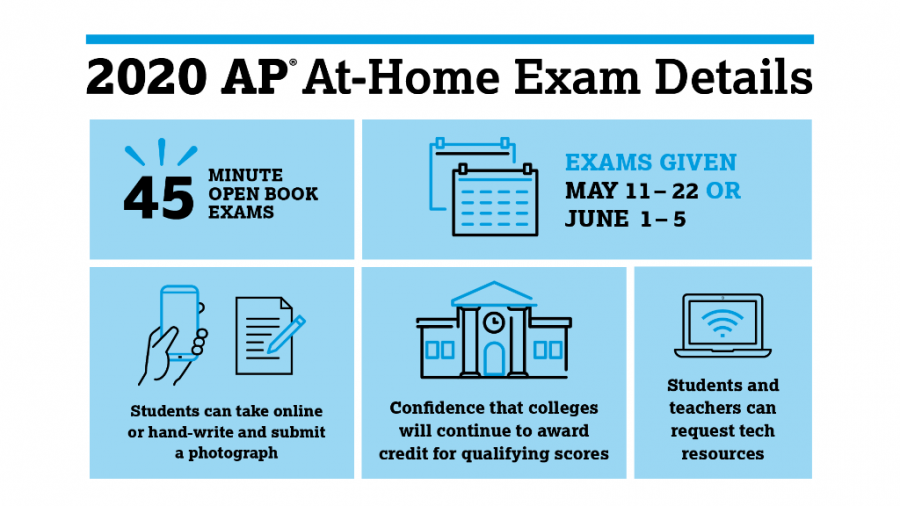Opinion on Online AP tests from an AP Tester
May 30, 2020
After counties shut down schools around the nation, preventing in-person AP tests from commencing, CollegeBoard had decided to create a new online version. The quality and fairness of the new tests have been questioned. After taking the tests myself, I have found it to be better than I expected, but still not without its flaws.
Initially, when I heard that CollegeBoard was going to hold AP tests online, one thought came to my mind — cheating. To me, technology and tests were two things that simply did not go together. Even though I knew that some colleges were accustomed to holding at-home tests, CollegeBoard was not putting in place the strict requirements held by colleges. For example, during an at-home test, some colleges require web-cams to be on to detect suspicious activities and a secure browser to prevent online searching. CollegeBoard used none of these precautions. In fact, they allowed online searching. That alarmed me. Lots of my friends joked with me that everyone was going to get a 5.
Foreseeing cheating during online testing, CollegeBoard allegedly attempted to catch cheating through social media stings. Many believe the company created a Reddit account with the username “dinosauce313.” The timing, generic username, style of posts, etc. were elements that raised many eyebrows around the user. Most people were subsequently suspicious of the account and some even decided to bombard its posts with memes, inappropriate content, and ridiculing comments to point out to CollegeBoard that it was not fooling anyone. It was clear from the beginning that “dinosauce313” was not going to be effective at stopping cheating.
Despite CollegeBoard’s alleged failures to directly prevent cheating, my initial impression that it would be the underlying issue was quickly changed while taking my first AP test. With the limited time of 50 minutes per test and many parts to a question, there simply was not enough time to converse with a friend or search for answers.
To me, the new problem was that there was not enough time given for one question. While I do understand that the time pressure helps prevent cheating, it is a huge problem on its own. Seeing so many parts to a question gave me anxiety, preventing me from answering questions quickly and even making my mind go blank on problems I would usually be comfortable with. The prospect that I may not have been able to submit my test and end up getting zero points on a question did not help either.
As much as I hate long tests, it’s almost impossible to gauge one’s overall knowledge on a subject in just a 50-minute test. This was really evident on my AP World History test, where there was a prompt that centered around one unit of the whole course. For those who were familiar with the unit, it was a blessing. Others were not so lucky. Hypothetically, someone could only know one topic from the course and get a perfect score. Equally, someone could be flawed at just one particular topic in the whole course and be unlucky to get a question that centers around that concept. For this reason, I believe scores could be inaccurate this year.
Multiple versions of an AP test also arise new problems. Some tests may cover generally easier problems which may give some students another unfair advantage or disadvantage. This may have been present in the rhetorical analysis AP Lang test, where different texts could have varying difficulties in analysis. Kory Stamper, a writer who had her book used for a question for an AP Lang test, even commented on the question regarding her book, saying, “Srsly[seriously] though, there are no rhetorical devices anywhere in that damned book, and I should know because I wrote it.” Other students, on the other hand, may have gotten a text filled with rhetorical devices. This is not a problem for which I completely blame CollegeBoard, as it is a precaution that prevents cheating, but there are definitely problems that are harder, and CollegeBoard has the data to identify those problems to make such problems accordingly.
Other inaccuracies may arise from the fact that there were complications for 1% of students who took the test. While that may sound like a low number, that accounts for over 10,000 students who will have to retake their respective tests. Not only are those students subject to test preparation stress, but the re-take is likely to be harder as evident in previous AP test retakes, which is simply not fair.
Some of the reasons as to why 1% of students were not able to submit their answers could stem from distractions, test-anxiety, poor connection, or technology unfamiliarity. Unfortunately, there is not much CollegeBoard can do about the environment or uneasiness of a test taker. However, some test takers have cited a bug that explains their problem when submitting, which has been admitted by CollegeBoard. Although I did not have any complications submitting my work, I have heard from several people in my school that their “submit button” would not work. Not only is this understandably frustrating, but it is also completely unacceptable that a billion-dollar company like CollegeBoard would build an error-prone testing software that could have major implications for a student. Even accounting for the expenses to make tests and pay workers, there should be enough money to build a good testing solution!
Although this did not apply to me, I also found it ridiculous that CollegeBoard forced international students who wanted to take AP tests to take it as early/late as 3:00 AM. Personally, I cannot think clearly during that time and it is unrealistic to expect someone to perform well in such a situation. In addition, I cannot imagine the frustration that may occur if there are any problems while an international student is taking a test. To subject any student through this is inhumane and inexcusable on the part of CollegeBoard.
While I am mainly disappointed at the job CollegeBoard has done, I do applaud CollegeBoard for adjusting to a difficult time. It was a new experience for everyone and I did not expect CollegeBoard to do it perfectly the first time. That being said, there are some major pitfalls with this year’s exams. If I were CollegeBoard, I would break up the questions to even smaller sections which would reduce penalties for failing to submit a question and reduce test-anxiety, make multiple tests that are of equal difficulty and a bit longer to ensure fairness and reliability, accommodate for special situations better for international students, and fix bugs on their software. If CollegeBoard holds AP tests online in the future and makes these changes, I am confident that online testing will become an adequate alternative to traditional testing. For now, however, there is much room for improvement.




